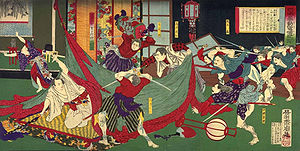Shimpūren Rebellion
| Shinpūren Rebellion | |||||||
|---|---|---|---|---|---|---|---|
| Part of Shizoku rebellions of the Meiji period | |||||||
 Shinpūren rebellion. Attack on Major General Taneda Masaaki (種田政明). |
|||||||
|
|||||||
| Belligerents | |||||||
| Imperial Japanese Army | shizoku rebels of former Kumamoto Domain | ||||||
| Commanders and leaders | |||||||
| Kodama Gentarō | Otaguro Tomoo | ||||||
| Strength | |||||||
| 300 | 174 | ||||||
| Casualties and losses | |||||||
| 60 dead, 200+ injured | 124+ seppuku, 50 injured | ||||||
The 1876 Shinpūren rebellion (神風連の乱 Shinpūren no ran / Jinpūren no ran?) was one of a number of ex-samurai uprisings which took place in the early Meiji period against the new Meiji government of Japan. The rebellion began in Kumamoto on 24 October 1876.
Following the 1868 Meiji Restoration, many members of the former samurai class were disgruntled with the direction the nation had taken. The abolition of their former privileged social status under the feudal order had also eliminated their income, and the establishment of universal military conscription had replaced much of their former role in the society. The very rapid modernization (Westernization) of the country was resulting in massive changes to Japanese culture, dress and society, and appeared to many samurai to be a betrayal of the joi ("Expel the Barbarian") portion of the Sonnō jōi justification used to overthrow the former Tokugawa shogunate. The Shinpūren was an extremist and xenophobic political society of ex-samurai from Kumamoto Prefecture led by Otaguro Tomoo (1835–1876), which grew out of the teachings of Hayashi Ōen. The members were not satisfied with halting the westernization process—they wanted to turn the clock back and eradicate every trace of it, including the wearing of western clothes, use of the Western calendar, and even the use of Western weapons. Members carried salt with them at all times for use in ritual purification of polluting foreign influences, such as electricity, railroads, and even Buddhist priests. They were incensed by government decrees permitting foreigners to purchase land in Japan, to allow missionaries to spread the Christian religion, and to forbid the carrying of swords. A rumor that Emperor Meiji was planning a trip overseas was the final straw.
...
Wikipedia
